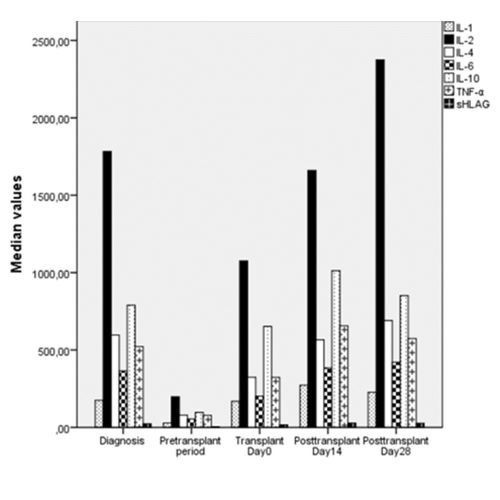
Contributions
Abstract: EP1244
Type: E-Poster Presentation
Session title: Stem cell transplantation - Clinical
Background
There are few studies about cytokines and soluble human leukocyte antigen-G (sHLA-G) levels in patients with acute leukemia undergoing allogeneic stem cell transplantation (allo-SCT). Proinflammatory and antiinflammatory cytokines maintain a balance between hematopoietic stem cell and lineage spesific cell in a healthy marrow; however, this balance is disrupted in case of leukemic transformation. In addition, HLA-G expressed in leukemic cells contributes to the uncontrolled proliferation of the leukemic cell by protecting the leukemic cell from NK-mediated lysis and apoptosis. Few studies have been reported that the balance of inflammation during allo-SCT is also mediated by cytokines, which stimulate inflammation by proinflammatory cytokines as well as suppress inflammation by anti-inflammatory cytokines and sHLA-G.
Aims
The aim of the present study was to investigate the role of cytokines and sHLA-G levels measured at five different time points in children with acute leukemia undergoing allo-SCT.
Methods
This was a prospective longitudinal cohort study. A total of 41 patients with acute leukemia were recruited in this study. Among them, 26 consecutive patients were examined during the diagnosis of acute leukemia and in the remission period before transplantation (PreTx). The remaining 15 patients were included on the day of transplantation (Tx0). A total of 41 patients with acute leukemia were also examined on the 14th (PostTx14) and 28th (PostTx28) days after transplantation. Serum levels of pro-inflammatory (IL-1, IL-2, IL-6, TNF-α), anti-inflammatory (IL-4, IL-10) cytokines and sHLA-G were measured by ELISA (Bioassay Technology, China). This study was approved by the Institutional Review Board. All statistical analyses were performed using SPSS 15.0 program.
Results
The median cytokine and sHLA-G levels in leukemia diagnosis and post-transplantation periods (Tx0, PostTx14, PostTx28) were found to be significantly higher than the cytokine and sHLA-G levels in the pretransplantation period (p<0.05). Serum IL-1, IL-4, IL-10, and sHLA-G levels at diagnosis were significantly higher in children with relapse acute lymphoblastic leukemia (ALL) than in children without relapse ALL (p<0.05). Compared with patients who had pre-B-ALL and acute myeloblastic leukemia, median serum IL-2, IL-10, and sHLA-G levels were significantly higher in patients with T-ALL (p<0.05 for all). The sHLA-G serum level was strongly correlated with serum IL-4 (r=0.94) and IL-10 (r=0.92) levels (p<0.05). In the Tx0 and PostTx14 days, transplantation related complications, relapse, and mortality risk were found to be approximately 2.5 times higher in patients with elevated cytokines and sHLA-G levels.

Conclusion
Our results indicate that elevated anti-inflammatory cytokines and sHLA-G levels at diagnosis can be associated with relapse in pediatric ALL, and also elevated cytokines and sHLA-G levels during transplantation have a negative effect on survival in leukemia.
Keyword(s): Cytokine, HLA, Leukemia, Transplant
Abstract: EP1244
Type: E-Poster Presentation
Session title: Stem cell transplantation - Clinical
Background
There are few studies about cytokines and soluble human leukocyte antigen-G (sHLA-G) levels in patients with acute leukemia undergoing allogeneic stem cell transplantation (allo-SCT). Proinflammatory and antiinflammatory cytokines maintain a balance between hematopoietic stem cell and lineage spesific cell in a healthy marrow; however, this balance is disrupted in case of leukemic transformation. In addition, HLA-G expressed in leukemic cells contributes to the uncontrolled proliferation of the leukemic cell by protecting the leukemic cell from NK-mediated lysis and apoptosis. Few studies have been reported that the balance of inflammation during allo-SCT is also mediated by cytokines, which stimulate inflammation by proinflammatory cytokines as well as suppress inflammation by anti-inflammatory cytokines and sHLA-G.
Aims
The aim of the present study was to investigate the role of cytokines and sHLA-G levels measured at five different time points in children with acute leukemia undergoing allo-SCT.
Methods
This was a prospective longitudinal cohort study. A total of 41 patients with acute leukemia were recruited in this study. Among them, 26 consecutive patients were examined during the diagnosis of acute leukemia and in the remission period before transplantation (PreTx). The remaining 15 patients were included on the day of transplantation (Tx0). A total of 41 patients with acute leukemia were also examined on the 14th (PostTx14) and 28th (PostTx28) days after transplantation. Serum levels of pro-inflammatory (IL-1, IL-2, IL-6, TNF-α), anti-inflammatory (IL-4, IL-10) cytokines and sHLA-G were measured by ELISA (Bioassay Technology, China). This study was approved by the Institutional Review Board. All statistical analyses were performed using SPSS 15.0 program.
Results
The median cytokine and sHLA-G levels in leukemia diagnosis and post-transplantation periods (Tx0, PostTx14, PostTx28) were found to be significantly higher than the cytokine and sHLA-G levels in the pretransplantation period (p<0.05). Serum IL-1, IL-4, IL-10, and sHLA-G levels at diagnosis were significantly higher in children with relapse acute lymphoblastic leukemia (ALL) than in children without relapse ALL (p<0.05). Compared with patients who had pre-B-ALL and acute myeloblastic leukemia, median serum IL-2, IL-10, and sHLA-G levels were significantly higher in patients with T-ALL (p<0.05 for all). The sHLA-G serum level was strongly correlated with serum IL-4 (r=0.94) and IL-10 (r=0.92) levels (p<0.05). In the Tx0 and PostTx14 days, transplantation related complications, relapse, and mortality risk were found to be approximately 2.5 times higher in patients with elevated cytokines and sHLA-G levels.

Conclusion
Our results indicate that elevated anti-inflammatory cytokines and sHLA-G levels at diagnosis can be associated with relapse in pediatric ALL, and also elevated cytokines and sHLA-G levels during transplantation have a negative effect on survival in leukemia.
Keyword(s): Cytokine, HLA, Leukemia, Transplant


